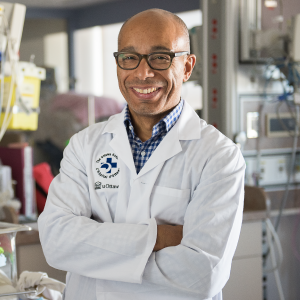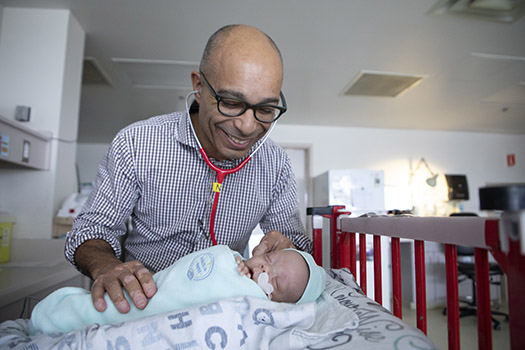
Every day, Dr. Bernard Thébaud creates futures for Ottawa’s youngest community members. As a senior scientist with the Ottawa Hospital Research Institute, and as a neonatologist with the Children’s Hospital of Eastern Ontario (CHEO), Dr. Thébaud provides care to critically ill newborns. Born and raised in Munich, Germany, Dr. Thébaud studied medicine in Strasbourg, and pediatrics in Paris, ultimately starting his research career at the University of Alberta after completing a post-doc there. In 2012, The Ottawa Hospital recruited Dr. Thébaud to accelerate the use of stem cell-based therapies for lung diseases.
In 2022, Dr. Bernard Thébaud received the Chrétien Researcher of the Year Award for his pioneering research on neonatal health, including a recent paper showing that nano-therapy for micro-preemies protects not only the lungs, but also the brain in lab models.
Read on to learn the sport that led him to medicine.
Q: Can you tell us a little bit about your childhood?
A: When I think about my early years, they were clearly marked by my passion for a particular sport: soccer. It was school, homework, then soccer until dusk.
I had a former German national player as a coach, and he taught us really everything about the “beautiful game”: the discipline, the perfection, the importance of a healthy lifestyle, the resilience. And all these lessons, they turned out to be very helpful in my later life.
The most important thing I learned was impact. In competitive sport, the goal is always winning. And so the question is: Can you make a difference? Can you be a “game-changer”?
Here at The Ottawa Hospital, it’s exactly the same: How can we impact the game for our babies? The bottom line is improving the outcomes of babies born too soon. And whatever is not geared towards this, you shouldn’t waste your time with.

"We're at a point where we really need another breakthrough. I hope my research will contribute to that."
— Dr. Bernard Thébaud
Q: How did you wind up in neonatology?
A: I remember the day very clearly when I decided to go into medicine. I was 14 or 16, and my dad asked, “So, what do you want to do later in life?” I said, “I don’t know.” He said, “how about sports physician?” And I said, “That’s it.” From that moment on, I wanted to become a physician.
Of course, as you go through medical school and meet people, you realize what you’re passionate about. I did a rotation in pediatric surgery, and I loved it. Immediately from the first day, I knew I would become a pediatrician.
Later on, I discovered a new dimension, through research — that you could actually answer some of the big questions in the lab. That was fascinating.
Later, I was drawn towards neonatology because it had that element of urgency and physiology. I had great teachers, and they taught me a lot about the beauty of neonatology — about not just accepting the status quo and applying protocols, but thinking every day about how you can improve things, make them a little bit better.
Q: How has the field of neonatology changed since you started?
A: There were amazing breakthroughs in neonatology in the ’90s with using surfactant to treat acute respiratory distress syndrome in preterm babies. Through research, it was discovered these babies lacked surfactant, and then it took another 30 years to actually turn that into medication. Many of my colleagues practiced neonatology when surfactant didn’t exist, and they could really see the switch between the before and after. When you see how fast surfactant works, it’s really impressive.
Then inhaled nitric oxide came; this is more for high blood pressure in the lungs, pulmonary hypertension, and that was also a game changer.
So, survival in neonatology improved over time, but in a sense, neonatologists are the victims of their own success. We got to care for more preterm infants that were born and saved at lower gestational ages, but that came with more challenges. The organs of these premature babies are younger, more immature, and more fragile. The task of protecting them becomes more difficult.
Every 15 years or so, we have seen the patient population change, and we have to get better at things. We’re at a point where we really need another breakthrough. I hope my research will contribute to that.
What is surfactant?
Surfactant is a liquid produced by the lungs that keeps the airways open. Production starts at 26 weeks gestation, and babies born before 37 weeks may not have enough yet, causing breathing issues.
Q: Can you tell us a little bit about your research?
A: We may have really reached the limit of biological viability; the lungs in the youngest NICU babies are so immature that a breakthrough is required to protect the lung from injury and at the same time promote growth. We believe stem cell-based therapies for regenerating the lungs will be one such breakthrough.
I’m specifically looking at these therapies for chronic lung disease of prematurity, or bronchopulmonary dysplasia. This is the most frequent complication in preterm babies, but it’s also an independent risk factor for adverse neurodevelopmental outcomes. It also requires a lot of oxygen, and giving babies the oxygen they require is not good for their eyes, which puts them at risk of blindness or eyesight impairment. If we could treat this one disease, we could actually get rid of three. If we can protect the lungs with these cells, that will positively impact the overall outcome of these preterm babies.
Q: What does a well-funded Ottawa Hospital Research Institute mean for your research?
A: It’s absolutely critical. It’s an absolute priority. A well-funded research institute means better quality research and faster translation from the lab to the patients. It means discoveries today, revolutionary medications tomorrow.
We compete for funding at the federal level, but if you really want your research to make an impact in patients and bring discoveries from the lab into the clinic, there needs to be additional funding, otherwise, it’s not going to happen.
"A well-funded research institute means better quality research and faster translation from the lab to the patients. It means discoveries today, revolutionary medications tomorrow."
—Dr. Bernard Thébaud
Q: What is so exciting about your award-winning research on nano-therapy protecting lungs and brain?
A: Currently, babies who develop lung disease have adverse neurodevelopmental outcomes. Their brain function is impaired, and we won’t know why that is.
The current treatment we have for this is corticosteroid called dimethicone. The problem is the dimethicone stops brain growth and it stops lung growth. On the one hand it does something good, on the other hand it does something bad.
With our research, we used our classical model, and instead of looking at the lungs, we decided to look at the brain. We showed that whatever causes bronchopulmonary dysplasia also causes the brain stem to be abnormal.
Then, we showed the cell therapy we’re trying to develop actually protects the lungs but also protects brainstem cells. It’s basically the ‘perfect’ therapy because it doesn’t have the adverse effects.
Q: What does winning the Chrétien Researcher of the Year Award mean to you?
A: For me, the award is a marker that we are doing something that matters. It is definitely motivating. This award is very prestigious, underscoring that this is important work and we are on the right path.
Q: What is the most inspiring part of your work in neonatology?
A: For me, the resilience of these babies is fascinating. Their lungs are so immature, and yet they still succeed in breathing — yes, with our help, but they have the potential; we’re just supporting them with what they need.
The most exhilarating is when they go home. This is when you have tears in your eyes, because you say, “Wow, they made it.” And the parents, of course, are over the moon. You know once they go home, they will thrive.
"Working with babies is, I think, the most beautiful job on Earth. Because they're born, and they have all their life and all their potential in front of them. Our task is to give them a great jumpstart."
— Dr. Bernard Thébaud


